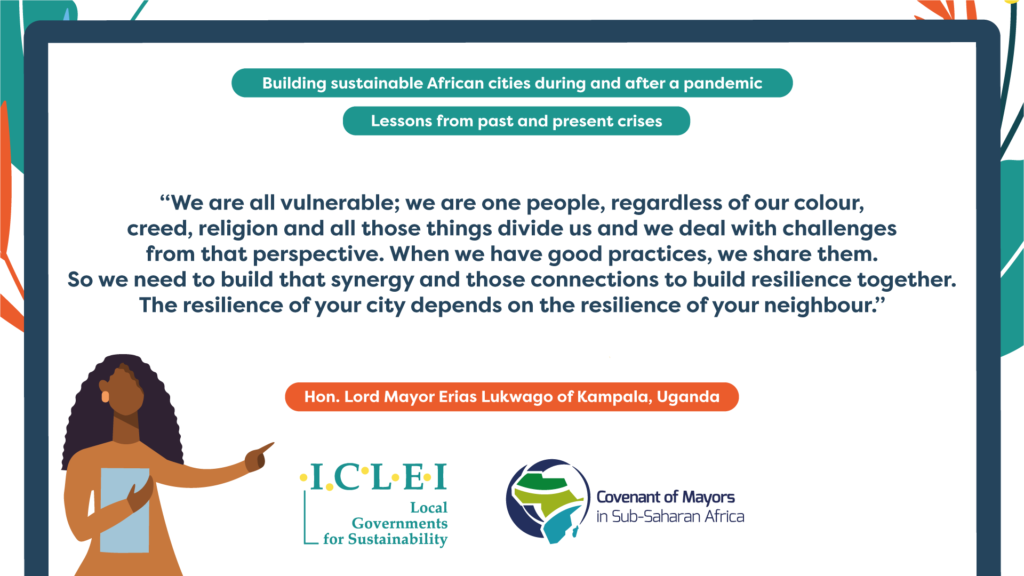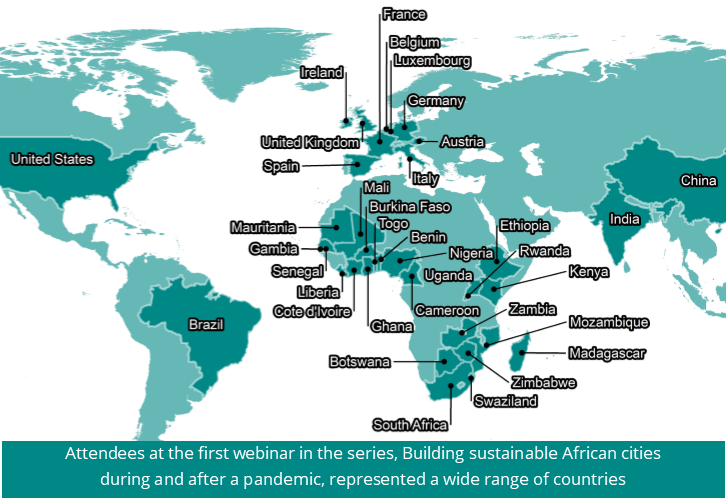4 June 2020
African mayors and city leaders stand in solidarity in response to global crises
African mayors and city leaders stand in solidarity in response to global crises



Strengthening networks to exchange knowledge and best practices is key to building resilient cities during and after global crises. This was the common message from the speakers at the launch event of our new webinar series specifically curated for African cities. Building sustainable African cities during and after a pandemic is presented in partnership with the Covenant of Mayors in Sub–Saharan Africa (CoM SSA). The first edition, Lessons from past and present crises, featured mayors and city experts from Uganda, Liberia and Senegal and attracted more than 100 attendees from all corners of the continent and beyond
“The resilience of your city depends on the resilience of your neighbour.”
The Lord Mayor of Kampala, Mr Erias Lukwago’s succinct message encouraging African cities to stand in solidarity was one of the key insights of the first webinar. Alongside Lord Mayor of Monrovia, Mr Jefferson T. Koijee, and Mr Mouhamed Diop, Director at CIFAL-Dakar, he emphasised the value of networks that connect city leaders across the continent to empower each other by sharing knowledge and best practices.
According to Mayor Lukwago, access to information is pivotal in building resilience, which is why it so important to strengthen our knowledge-sharing platforms: “The Covenant of Mayors in Sub-Saharan Africa is important to us; we need to understand what is happening in Kigali, Bamako, Pretoria; we need a common front to see where we are falling short.”

For Mayor Koijee (Monrovia), connecting communities and city leaders through dialogue is an important form of exchange. A staunch advocate for social justice and youth empowerment, Mayor Koijee’s approach is people-focused and highlights community engagement as being central to building resilience. “People are our greatest assets,” he said, explaining that community leaders play an instrumental role in devising innovative solutions that speak directly to a community’s challenges.
“Engage with the communities directly. We sit in our offices and we form solutions. When you engage the people you realise the solutions you are looking for could be with them.” — Lord Mayor of Monrovia, Jefferson T. Koijee.
The value of direct dialogue and engagement with communities extends to the value of larger knowledge sharing networks. Mayor Koijee noted that city networks are platforms “for mutual support, an avenue for knowledge and change.”


He raised the issue of social distancing measures to contain the spread of the coronavirus which has been particularly challenging in his community. These challenges are shared by municipalities across the continent: representing Senegal in this live discussion, Mr Mouhamed Diop, Director of CIFAL-Dakar, pointed to the manner in which the City of Dakar managed to contain their infection rate, which he cited as a direct outcome from the learnings from other cities’ response to present and past crises: “This network is a way to benchmark and learn from one another. If Dakar is able to contain this pandemic, it is because we tapped into what other countries have done from other pandemics, including Ebola.”
Mr Diop heads a knowledge hub for sustainable African cities to exchange best practices in Senegal, and francophone West-Africa more broadly. He pointed to a world that is no longer the same as it was yesterday; a world that requires new solutions, such as digital means, to respond to clear objectives effectively: “We are sitting in a webinar today,” he said, referring to the live discussion as a direct example of how individuals and city leaders from across Africa can connect and exchange knowledge. “This network is perfectly relevant in this pandemic to share our experience and our practices. We have seen incredible results. We are part of this network to learn and show solidarity. We need to mitigate risks through sharing. This is the goal of these networks. What matters is for local governments everywhere to work hand in hand.”

The role that local government plays in responding to unprecedented crises is clear: Mayor Koijee of Monrovia pointed to city officials being first-responders, and that building resilience at the local level is crucial in countries’ response to pandemics.
While our challenges are diverse, Mayor Lukwago of Kampala reflected on our collective vulnerability: “This pandemic has equalised all of us; we are one people, regardless of our colour, creed, religion and all those things divide us and we deal with challenges from that perspective. When we have good practices, we share them. We need to build that synergy and connections to build resilience together. The resilience of your city depends on the resilience of your neighbour.”
The three speakers shared their lessons and messages of solidarity with more than 100 attendees from across the continent and the world, who turned the live chat into an interactive exchange of messages of solidarity, questions, comments and ideas. This webinar demonstrated that networks and borderless platforms for sharing best practices and knowledge, contribute to African city leaders’ willingness to drive action in a responsive and sustainable manner. By standing in solidarity and learning from each other, a local government network becomes a community that can build common resilience in the face of pandemics and other global shocks.

Watch the full webinar recording here.
The webinar series, Building sustainable African cities during and after a pandemic, will present at least two webinars a month and continue to draw on the insights of African mayors and urban sustainability experts. Upcoming themes include effective communication, energy access, food systems, nature-based solutions and planning for climate change. Click here for more information and to sign up to receive upcoming invitations to webinars.
Building sustainable African cities during and after a pandemic: Lessons from past and present crises.
— ICLEI Africa (@ICLEIAfrica) June 2, 2020
A strong message of solidarity from Hon. Lord Mayor Erias Lukwago of Kampala, Uganda.#AfricanCitiesInSolidarity pic.twitter.com/3EJ6dUa2B1
"People remain our greatest asset," says Hon. Lord Mayor Jefferson T. Koijee of @MonroviaCA during our webinar, Building sustainable #Africancities during and after a pandemic: Lessons from past and present crises.#AfricanCitiesInSolidarity
— ICLEI Africa (@ICLEIAfrica) June 2, 2020
In partnership with @CoMOSSAfrica. pic.twitter.com/hYd4ilZXql
To respond to crises, #localgovernments must work hand in hand regardless of borders. A strong call to our #cities from Mr Mouhamed Diop, Director of CIFAL, Dakar during our #webinar, Building sustainable African cities during and after a pandemic.#AfricanCitiesInSolidarity pic.twitter.com/YTNLu2EcMP
— ICLEI Africa (@ICLEIAfrica) June 2, 2020
The webinar series is presented by ICLEI Africa in partnership with the Covenant of Mayors in Sub-Saharan Africa with support from the European Union (EU), BMZ (German Ministry for Economic Development and Cooperation) and AECID (Spanish Agency for International Development Cooperation).

